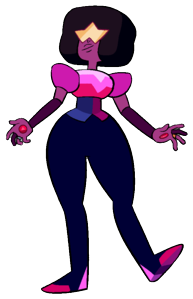By Princess A.
Stories we see in the media and entertainment that we consume can greatly affect the way we think and what we believe. As trans and queer young people, we need our identities to be visible and normalized. Being able to see a part of your identity on screen is affirming and inspires trans and queer youth to embrace who they are and share their truths.

I remember with great clarity the first time I felt seen while watching a TV show. I was watching the cartoon Steven Universe, a series that is widely popular with LGBTQ+ youth. I was first attracted to the show because of the cute art style and soundtrack, but was later drawn in by the characters and their stories. I saw lesbians, nonbinary folks, and asexual identities uplifted.
For me, watching the show and seeing femme characters attracted to each other was a pivotal moment in my journey toward self discovery. One such character was Garnet, a darker skinned character and unapologetically queer, who made me want to be strong and empowered. Garnet was an honest character who explained her struggles with her identity, challenged the gender binary by saying she was an “experience” rather than one particular gender (Garnet still used she/her pronouns), and chose her own happiness over the opinions of others. By always choosing herself and those close to her, rather than silencing herself to fit in, Garnet reminded me to take up space and that the closet is no place to live.
Steven Universe showed me how the media and storytelling can be tools for the normalization of LGBTQ+ identities. Just knowing that these positive affirmations were happening on a children’s show was impactful. The characters were authentically themselves and no one made a big deal of it. They were not only characters that other trans and queer people could connect with, but they allowed kids to expand their world views and learn about different types of identities. Being so commercialized and popular, the show provided a perfect platform for showcasing those different LGBTQ+ identities and sharing narratives about being understood, loved, and accepted. The show touched on other LGBTQ+ topics, such as feeling like part of a community and resilience.
Storytelling not only empowers the writer but also inspires readers to embrace themselves and the individuality of others. Garnet’s story, although fictional, influenced my views about my own identity. These stories, and the many stories like it, need to be told. I encourage you to tell your story and be someone else’s inspiration.
